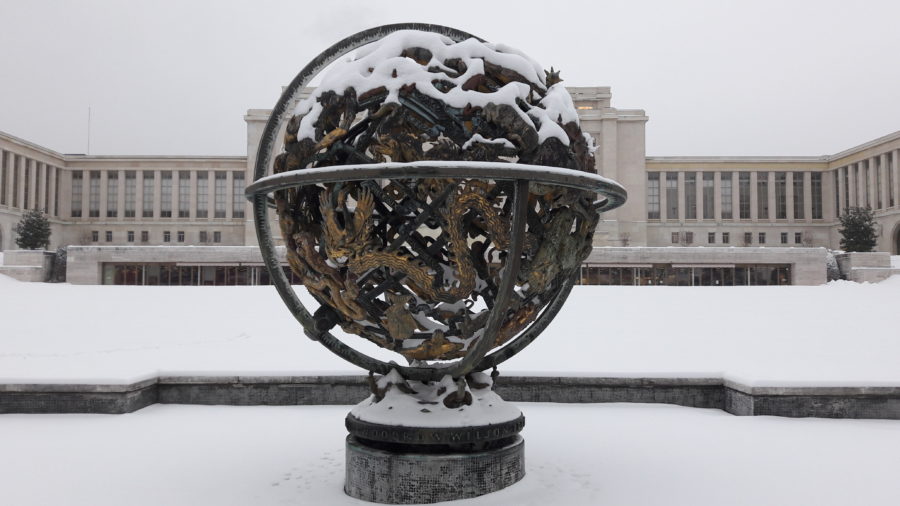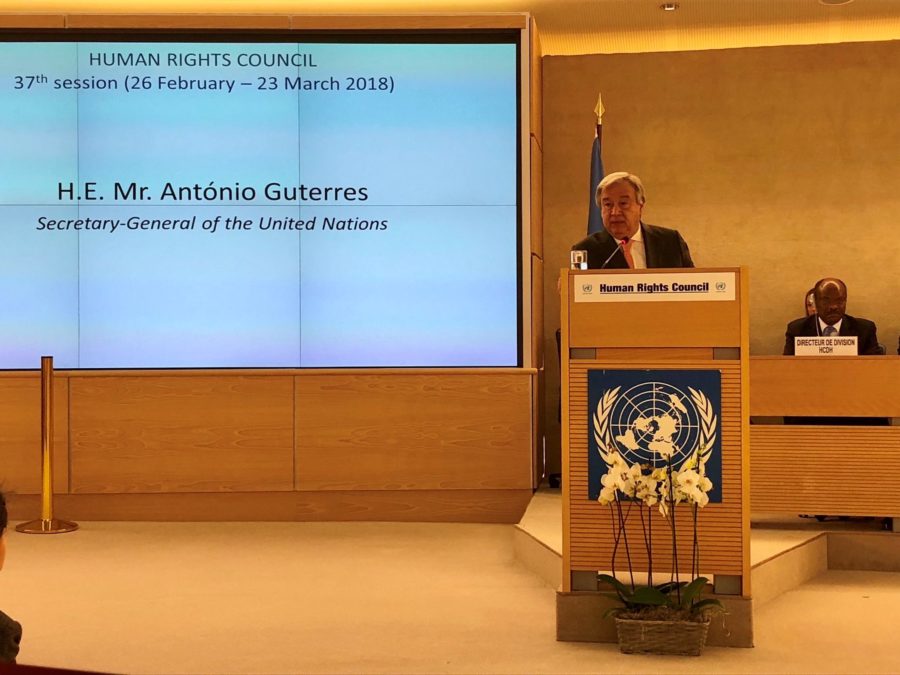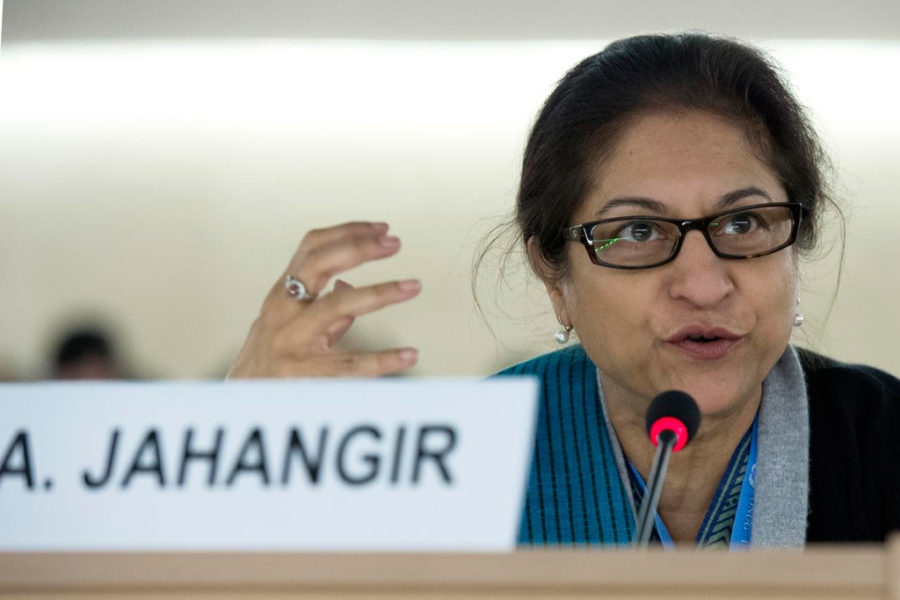19th March 2018 Geneva, Switzerland
The Chill Factor

Since the number of blog followers clamouring for a Council update has now reached single figures (thanks Nuala) I thought I’d better respond.
It’s been busy. And cold. But mostly busy.
As the 3rd week of the session came to end, UN staff voted to go on strike over impending allowance cuts, which suspended the Council’s plenary. It’s fair to say that most Council goers are not thrilled by the prospect of making up time with night sessions in the final week, but we were all glad for some respite during a particularly intense session. It gave me the chance to do an update and I even made it to the shops in time to respond to a domestic cat litter crisis which was threatening to get out of hand.
The main talking point in a hectic first week was the Urgent Debate on Eastern Ghouta, called by the UK with the support of many others. It was an unusual step for the Council and a reflection of the gravity of the attacks on the besieged civilian population, which are still continuing with increasing barbarity. At the Council’s opening, UN Secretary-General Guterres, spoke in the strongest terms saying it was “high time to stop this hell on earth”. The Council was clear in its condemnation of the cruel denial of humanitarian access and failure to abide by the ceasefire demanded by the UN Security Council. A strong majority of Council members backed a resolution demanding an end to violations, despite Russia’s denial of what was, and still is, clearly taking place. As the death toll continues to rise, there is an urgent need for the Assad regime’s to abide by the calls of the international community and stop its atrocities.

The alarming situation of the Rohingya, which the Council addressed at a Special Session in December, has also been a major feature of the session so far. Secretary General Guterres described the situation as ethnic cleansing, while both High Commissioner Zeid and Special Rapporteur Yanghee Lee have suggested that the situation could amount to genocide. The Council’s Fact-Finding Mission, has rightly withheld giving a formal determination while it completes its investigation but the update provided by Chairperson Marzuki Darusman was deeply distressing. He said the Mission believed the many accounts it had heard of brutal gang rapes and other sexual violence against women and young children. Those present in the Council looked visibly shocked as he recounted the individual testimony of a mother who described seeing armed forces attack her family and who was forced to leave some of her children to be killed while she tried to save her other children.The EU’s draft resolution on Burma puts a strong emphasis on the need for justice and for evidence to be preserved so that perpetrators can be held to account. It will be important that the resolution remains strong and passes with the widest possible support.
As well as addressing the most dramatic crises of the day, the Council must also react when bad situations are visibly deteriorating. In that spirit, during the Council’s 2nd week, the UK delivered a joint statement on behalf of over 40 countries about the recent worrying events in the Maldives. Under a state of emergency declared by the President, human rights protections have been suspended, and leading judicial figures and political opponents have been detained. High Commissioner Zeid has called this “an all out assault on democracy,” and the UK statement called on the Maldives to cooperate with the Council and the High Commissioner and to restore human rights protections.
Among the many thematic resolutions presented this session, the one everyone has been talking about has been the latest draft put forward by China which began life as the ‘Win-Win’ resolution. This may have sounded innocuous, but behind the cheery title lay an existential threat to the UN’s human rights framework which sought to prioritise cooperation over the importance of responding to violations of human rights. The resolution has mutated in response to the many concerns expressed about the original draft and been renamed “mutually beneficial cooperation” but it remains problematic and looks likely to go to a vote.
This session’s ‘item 4’ debate on individual countries attracted more attention than usual when the UK devoted its statement to violations carried out by Russia. Russia’s behaviour on the international stage has long drawn heavy criticism as a result of illegal actions in Crimea, Eastern Ukraine, Georgia and Syria, all of which have been the subject of attention by the Council. Russia’s destructive role at the Council on many important issues no doubt contributed to it losing its Council seat at elections in 2016. The UK has judged it highly likely that Russia was responsible for the recent attack in the UK city of Salisbury, which saw the illegal use of a military grade nerve agent in contravention of the Chemical Weapons Convention. This fits into a wider patter of consistently violating international law and is deeply alarming. As the UK statement made clear, deliberate violations against one person can be an attack on us all.
Friday evening ended on a sombre note as colleagues gathered to pay tribute to Asma Jahangir whose untimely death has cast a shadow over the session. I first met her in 2002 and long admired her resilience and courage in speaking out for those who were most oppressed, whether it was women at risk of honour killings, persecuted religious minorities, people subjected to modern day slavery, or individuals who had been killed because of their sexual orientation. Asma made an immense contribution to human rights both in Pakistan and globally, and she was steadfast in always demanding that the truth be told. At a time when facts about human rights violations are increasingly challenged or denied, there is a greater need than ever for the authority of the Council’s truth telling mechanisms. She will be hugely missed.

Bob as one of your 1000’s of silent readers: thanks as ever for the brilliant blog. Sounds like a tough session. We are all behind you, cheering you on as you fight so hard for the sake of the victims 🙂
An insightful account of massively important work, as always Bob. Very best of luck to you and colleagues for the closing days of session